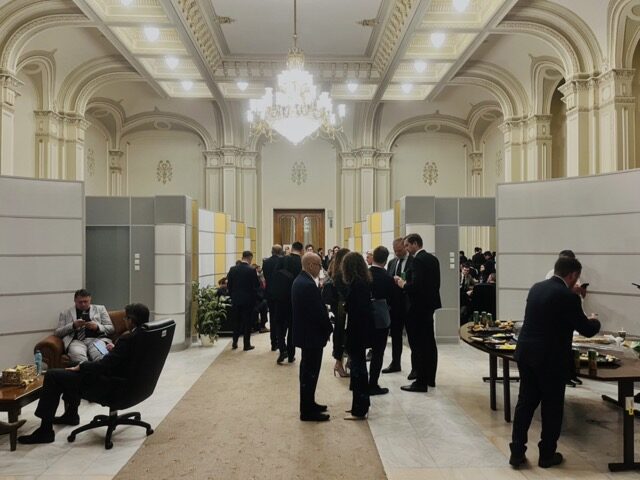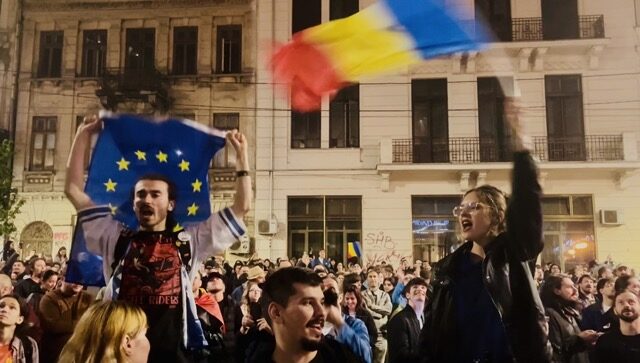Bucharest
Nodding along to “Y.M.C.A.” on the steps of Romania’s parliament building last night, in front of a wall of TV cameras, Right-wing populist presidential challenger George Simion appeared confident of victory as second-round votes began to come in. Giving a triumphant podium speech to the press, cheered by his Alliance for the Union of Romanians (AUR) party staff, Simion declared the beginning of a new era for democracy in the country. “I am the new president of Romania,” he tweeted shortly afterwards from inside AUR’s parliamentary offices.
But Simion’s declaration of victory was to prove dramatically premature, as centrist candidate Nicușor Dan triumphed. On Saturday, I’d asked Simion about his narrowing poll lead, which threatened to turn a comfortable victory into a shock defeat. “The polls are not really reliable in Romania,” he told me, assuring me he expected to win with a ten-point lead: “It will be a landslide.” Nonetheless, he set up arguments to contest a potential defeat, citing alleged voter fraud in neighbouring Moldova, whose ethnic Romanian-majority population overwhelmingly hold Romanian citizenship and are entitled to vote in the country’s elections. He also repeated his claim that significant numbers of dead people were registered as active voters, and that the French ambassador had meddled in the election.

Inside AUR’s parliamentary offices last night, the mood soured as results came in. Across most regions, Dan had secured a significant lead. In Transylvania, home to a large Hungarian minority — 6% of Romania’s population, almost uniformly dual-citizen Viktor Orbán voters — Dan’s vote share was overwhelming. Earlier in the week, in the Transylvanian city of Brașov, ethnic Hungarians had told me that despite their lack of enthusiasm for Dan, and despite Orbán’s late-stage semi-endorsement, Simion’s past activism with anti-Hungarian Romanian nationalists had made the prospect of his victory too unsettling to countenance. “This country needs change badly,” one ethnic-Hungarian restaurateur told me, “but Simion frightens me. Either way, we’re screwed.”
This time round, even the Western European diaspora vote — which in the first round had secured Simion’s leading place — did not come through to the extent AUR needed. One staffer told me that the party was planning to ask for a recount; another said they’d take the case to the constitutional court, previously an object of Simion’s ire. “This will be a legal battle,” they added.
On the balcony, rapidly filling up with downcast-looking smokers, an American activist for the campaign complained that the Trump administration’s arm’s-length approach to Simion had hindered his chances. The White House had spurned photo opportunities and direct endorsements, another American activist complained. Whether the Trump effect would have helped or hindered Simion is open to question, and a problem for the wider European Right to grapple with.
Eventually, Simion joined the activists gathered outside his office doors, giving an initially ambiguous message as they chanted his name. “I will fight together with you in all the battles we have ahead of us,” he said, “This work is just starting, and I will be there shoulder by shoulder with every one of you.” An hour later, he conceded defeat.
Outside the Hotel Cismigiu at the edge of Bucharest’s Old Town, a large crowd of jubilant Dan supporters chanted their victorious candidate’s first name. Waving Romanian and European Union flags, they cheered as their man ventured onto the ornate balcony above them. Mostly young and English-speaking, they represented the core audience for the reformist Bucharest Mayor they had chosen to save them from populist nationalism.

“My dad told me he had the same emotions during the [1989] revolution, and that’s why I voted for Nicosur,” a tearful Anna, 25, told me. “Simion was anti-abortion, anti-immigration, he didn’t support Ukraine, he didn’t support the Romanians in Moldova, and we are the voice for Ukraine, for abortion, for the LGBTQ+,” she said. “I don’t know, we’re the voice of good people, actually.”
“I’m extremely happy because we were heading down the wrong path with all this fascism and sovereignty,” 24-year-old Mircea said. “Us staying pro-EU and pro-Nato means so much for the internal stability of the country.”
Inside the Cismigiu, after a crowded press conference, I collared Dan as he posed for photographs with exultant campaign staff. Nearly half the country has shown they’re unhappy with the system in Romania, I told him, so what do you want to say to them? “First of all, my respect,” he answered, “Secondly, we have to rebuild the trust of all Romanian people in Romanian politics, and at that moment we’ll have only one society, not two.”
But the upset to Romania’s political class caused first by Cǎlin Georgescu’s candidacy, then by Simion’s near-victory, is unlikely to be resolved any time soon. Dan must contend with the country’s alarming budget deficit, as well as a widespread dissatisfaction with Romania’s political and economic path. Whether or not this is the end of the road for Simion, this volatile election has proved Romanian politics has a profitable gap for the right populist candidate to fill.










Join the discussion
Join like minded readers that support our journalism by becoming a paid subscriber
To join the discussion in the comments, become a paid subscriber.
Join like minded readers that support our journalism, read unlimited articles and enjoy other subscriber-only benefits.
Subscribe